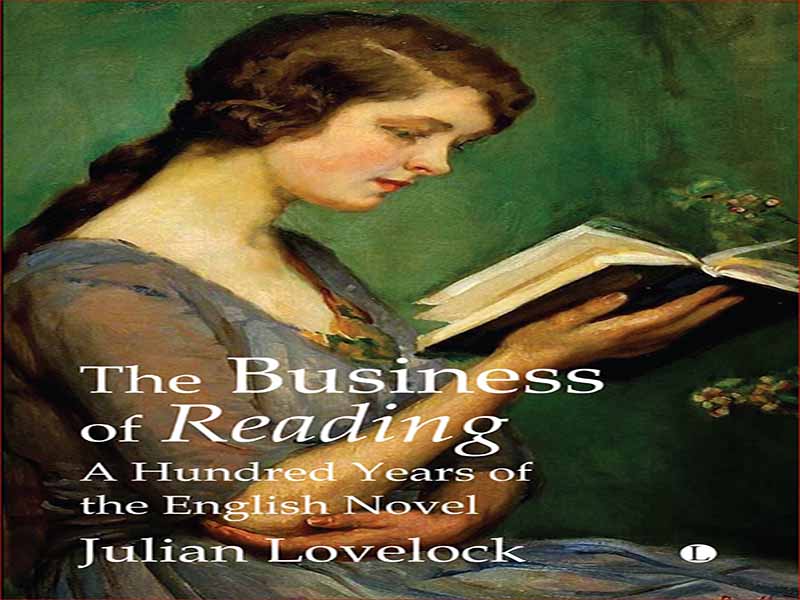- عنوان کتاب: The Business of Reading
- نویسنده: Julian Lovelock
- حوزه: مطالعه
- سال انتشار: 2022
- تعداد صفحه: 198
- زبان اصلی: انگلیسی
- نوع فایل: pdf
- حجم فایل: 5.36 مگابایت
این کتاب درباره کتاب است و نه درباره تاریخ ادبی یا بحث انتقادی. این در درجه اول برای خواننده عمومی، عضو باشگاه کتاب و دانش آموز است – برای کسانی که دوست دارند به طور جدی در مورد رمان با چای (یا قهوه ee) و کیک، یا چیز قوی تر صحبت کنند، اگر خورشید بالای حیاط است. یا همانطور که میس کالندر در کتاب مرد تاریخ مالکوم بردبری (به فصل 16 مراجعه کنید) به اختصار بیان می کند، «منظور شما این است که آیا من ساختارگرا هستم یا یک لیوسیت یا روانشناس، زبان شناس یا فرمالیست یا اگزیستانسیالیست مسیحی یا پدیدارشناس؟ … خوب، من هیچ یک از آنها نیستم … من کتاب می خوانم و با مردم در مورد آنها صحبت می کنم. برخی از آنها شناخته شده اما کمتر شناخته شده اند، و همچنین بازبینی یک کلاسیک قرن نوزدهمی. سعی میکند از تمایز بین رمانهای «ادبی» و «محبوب» اجتناب کند: منتقدان باید قضاوتهای ارزشی داشته باشند، اما دستهبندیها متقابلاً منحصر به فرد نیستند و احتمالاً رمانهای «محبوب» اغلب تأثیر بیشتری نسبت به همتایان «ادبیتر» خود دارند. به هر حال چارلز دیکنز در زمان خود یک رمان نویس «محبوب» بود، هر چند که ما امروز او را به حساب می آوریم. آونگ انتقادی عادتی سرگردان دارد که از یک افراطی به افراطی دیگر می چرخد. اولین رماننویسان انگلیسی اغلب ترجیح میدادند در پسزمینه بمانند: برای مثال، در رابینسون کروزوئه (1719) دانیل دفو ادعا کرد که تنها ویراستار داستان زندگینامهای خود کروزوئه است، سفرهای گالیور جاناتان سویفت (1726) به لموئل نسبت داده میشود. گالیور (تا حدی به این دلیل که سوئیفت نگران احتمال پیگرد قانونی برای طنز ضد ویگ خود بود)، و اولین نسخه پاملا ساموئل ریچاردسون به طور ناشناس منتشر شد. با این حال، چهل سال بعد، کتاب زندگی شاعران ساموئل جانسون (1779-1781) در کانون توجه زندگی و زمانه نویسندگان قرار گرفت، که از آن زمان به عنوان کانون اصلی انتقادی مد شده و از مد افتاده است. در پایان قرن نوزدهم، با روشی کاملاً متفاوت، آناتول فرانس پیشنهاد کرد که دیدگاه شخصی منتقد در واقع بسیار مهمتر از نویسندگان و حتی آثار آنهاست، و اعلام کرد که «منتقد خوب کسی است که ماجراهای داستان را روایت می کند. ذهن او در میان شاهکارهاست.»2 در اوایل قرن بیستم، صاحب نظران نقد عملی یا قرائت دقیق هر دو این رویکردها را رد کردند و به طور منطقی پیشنهاد کردند که متن، و نه نویسنده یا خواننده، باید در مرکز توجه انتقادی قرار گیرد. مواردی مانند منابع ادبی، بیوگرافی نویسنده و زمینه تاریخی در حاشیه.3 در ایالات متحده، «منتقدان جدید» خط مشی مشابه اما سخت تری را اتخاذ کردند، با W.K. ویمسات و مونرو بیردزلی «غالطه عمدی» و «اشتباه عمدی» را تعریف میکنند.4 «اشتباه عمدی» استدلال میکند که وظیفه منتقد این نیست که نگران قصد نویسنده باشد: زمانی که رمان، نمایشنامه یا شعر به پایان برسد. باید به خاطر چیزی که هست و نه به خاطر آنچه نویسنده فکر می کرد باید باشد، آب شود یا غرق شود. «اشتباه مؤثر» خواننده را از قضاوتهای انتقادی ذهنی که متن را با احساسات خود رنگ آمیزی میکند، هشدار میدهد. از اروپا نیز مفاهیم ساختارگرایی، پساساختارگرایی و ساختارشکنی، نظریههای انتقادی که ریشه در علم و فلسفه زبان دارند و بیشتر بر ساختار زبانی متن تمرکز میکنند تا معنا و ارزش آن، از اروپا سرچشمه میگیرند.
Th is is a book about books and not about literary history or critical debate. It is primarily for the general reader, the book club member and the student – for those who like to talk seriously about novels over tea (or coff ee) and cake, or something stronger if the sun is over the yardarm. Or as Miss Callendar puts it succinctly in Malcolm Bradbury’s Th e History Man (see chapter 16), ‘Do you mean am I structuralist or a Leavisite or a psycho-linguistician or a formalist or a Christian existentialist or a phenomenologist? … well, I’m none of them … I read books and talk to people about them.’1 Th e Business of Reading introduces twenty English novels of the past hundred years (that is, since the end of the First World War), some well known but most less so, as well as revisiting a nineteenth-century classic. It tries to avoid any distinction between ‘literary’ and ‘popular’ novels: critics have to make value judgments, but the categories are not mutually exclusive and arguably ‘popular’ novels oft en have more impact than their more ‘literary’ counterparts. Charles Dickens was, aft er all, very much a ‘popular’ novelist in his time however we regard him today. Th e critical pendulum has a disorientating habit of swinging from one extreme to another. Th e earliest English novelists oft en chose to stay in the background: for example, in Robinson Crusoe (1719) Daniel Defoe claimed only to be the editor of Crusoe’s own autobiographical story, Jonathan Swift ’s Gulliver’s Travels (1726) was attributed to Lemuel Gulliver (in part because Swift was worried about the possibility of prosecution for his anti-Whig satire), and the fi rst edition of Samuel Richardson’s Pamela was published anonymously. However, forty years later Samuel Johnson’s Lives of the Poets (1779–81) shone a spotlight on the life and times of writers, which have been in and out of fashion as the main critical focus ever since. At the end of the nineteenth century, on an altogether diff erent tack, Anatole France suggested the personal view of the critic is in fact far more important than writers and even their works, declaring that ‘A good critic is one who narrates the adventures of his mind among masterpieces.’2 Early in the twentieth century, the exponents of practical criticism or close reading dismissed both these approaches and proposed rather sensibly that the text, and not the writer or the reader, should be the centre of critical attention, relegating such things as literary sources, biography of the author and historical context to the sidelines.3 In the United States, the ‘new critics’ took a similar but harder line, with W.K. Wimsatt and Monroe Beardsley defi ning ‘Th e Intentional Fallacy’ and ‘Th e Aff ective Fallacy’.4 ‘Th e Intentional Fallacy’ argues it is not the critic’s job to worry about the author’s intention: once the novel, play or poem is launched into the world, it must fl oat or sink because of what it is and not because of what the author thought it should be. ‘Th e Aff ective Fallacy’ warns the reader against subjective critical judgements which colour the text with his or her own emotions. From Europe, in similar vein, came the concepts of structuralism, post- structuralism and deconstruction, critical theories rooted in the science and philosophy of language, and concentrating more on the linguistic structure of a text than on its meaning and value.
این کتاب را میتوانید از لینک زیر بصورت رایگان دانلود کنید:
Download: The Business of Reading


































نظرات کاربران